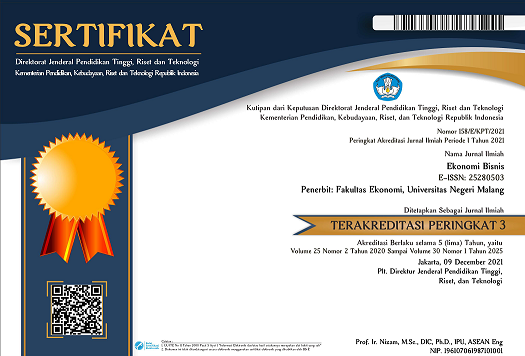Publication Ethics and Publication Malpractice Statement
EkonomiBisnis (EKOBIS) is a peer-reviewed journal published that aims to make continuous knowledge improvement in economics, management, and business studies. Thus, the quality of institutions, editors, peer reviewers, and work of the authors should agree upon the internationally accepted publishing standards.
EkonomiBisnis publication ethics and publication malpractice is arranged using COPE Guidelines on Good Publication Practice (1999), COPE Guidance for Editors (2014), and COPE Ethical Guidelines for Peer Reviewers (2013).
DUTIES OF EDITORS
Fair play and editorial independence
Editors of EKOBIS should evaluate submitted manuscripts objectively based on the manuscripts' academic core and specialty and its relevance to the journal's scope. With this in mind, editors are prohibited to evaluate journals based on the authors' background other than their academic experience. We strongly resist any discrimination based on race, gender, ethnicity, religion, citizenship, political view, or affiliation.
Disclosure and Confidentiality
Editorial board members of EKOBIS ensure will not use any unpublished information or findings in a submitted manuscript for their behalf, without the explicit consent from the authors. We ensure that any privileged information e. g. research findings, concepts, and ideas will be kept confidential and will not be published without the agreement from the author.
Publication decisions
Editors of EKOBIS ensure that all the potential manuscripts will undergo a peer-review process by --- the expert peer reviewers in the field. The editorial board members will make the publication decision based on the research validity, the importance of findings/ideas to researchers and readers, the reviewers' comments, and the legal requirements such as plagiarism and copyright infringement. Hence, it's important for researchers to include a publication malpractice statement within their submission.
Involvement and cooperation in investigations
After the publication, Department of Management, Faculty of Economics Universitas Negeri Malang as the publisher will take the immediate assessment if there is any ethical concern raised by society regarding the published manuscripts. We will investigate every reported act of unethical publishing behavior, even if it's discovered years after the publication. However, we will consider any advocacy the author concerned and finally make decisions based on our ethical standards.
DUTIES OF REVIEWERS
Contribution to editorial decisions
Peer review is an essential component of scholarly publishing and one of the crucial roles in scientific endeavors. Accordingly, EKOBIS will choose only peer reviewers who are experts at the journal's focus and scopes. In the evaluation process, peer reviewers will conduct peer reviewing and assist the editors to improve the submitted manuscripts.
Promptness
If the contacted peer reviewers feel unqualified to review the submitted manuscripts, the peer reviewers should notify the publisher and decline the invitation to review so that the alternative reviewers can be contacted immediately.
Confidentiality
All submitted manuscripts in EKOBIS are confidential documents. Thus, the manuscripts should not be shown to the public or discussed with others except it is authorized by EKOBIS editorial board of members. This ethical rule is applied also to the invited reviewers who decline the peer review invitation.
Standards of objectivity
The reviewers must conduct their obligation objectively and make reviews with supporting arguments so that author can use them to improve the manuscript. We disregard any subjective judgment or personal criticism given to our authors since it's an unethical deed in research field and could harm the journal's quality.
Acknowledgment of sources
If the submitted manuscript is found to potentially commit plagiarism or copyright infringement, peer reviewers are accountable to provide strong evidence i. e. the citations or previously published work. Peer reviewers are also responsible to notify the editors if they find any substantial similarities between the manuscripts they're reviewing.
Disclosure and conflict of interest
Any invited reviewer who has a conflict of interest with the manuscripts who undergo the peer review process must notify the editors to declare their conflict of interest and decline the invitation review. Unpublished materials and findings in the reviewed manuscripts must not be used for personal research without explicit consent from the authors. Privileged findings, concepts, or ideas must be kept confidential and not used for personal advantage. This ethical rule is also applied for the invited reviewers who decline the invitation.
DUTIES OF AUTHORS
Reporting standards
Authors should arrange their manuscripts with an accurate account of work and the results, objective discussions, also providing the significance of their work. Before the submission, authors must ensure their manuscript contain sufficient detail and considered as the final version of their work before getting an evaluation from the editors and peer reviewers.
Data access and retention
Authors will be asked to provide the raw data of their research findings along with the manuscript for editorial review. If the submitted manuscript is considered to get a publication, authors must agree to make the data publicly and concept the data visualization which will be included in their published manuscript.
Originality and plagiarism
Authors must ensure that their submission is entirely an original work, and if they use the work, words, or theories from others, they have cited it appropriately. If the editors or reviewers find the submitted manuscript paraphrase a part of previously published research without attribution, or even duplicates other research work, it will be considered as plagiarism. As has been noted, plagiarism is unethical conduct and is unacceptable.
Multiple, duplicate, redundant, or concurrent submission
Manuscripts describing essentially the same research must not be submitted in other journals and publications concurrently. Submission of the manuscript at the same time is considered an unethical publishing behavior and unacceptable. However, authors can submit their manuscript to another journal or publication after being notified that their manuscript cannot be considered to get a publication from the publisher.
Authorship of the manuscript
Not all people can be considered as the author of the submitted manuscripts. We, as publisher, expect the person worth to be listed meet the authorship criteria as follows:
1) The person made clear and significant contributions to the manuscript, whether it's the conception of the work, data collection, interpretation of data, and any work that contributed to the completion of the research.
2) Have drafted, proof-edited, or revised the manuscript critically thus made a significant improvement for the manuscript content.
3) Have discussed together and approved the final version of the manuscript, and agreed to submit their work for publication.
The person who doesn't meet the criteria as listed above shall not be considered as an author, even if they have a contribution to improving the manuscript technically.
Acknowledgement of sources
Authors must ensure they have properly acknowledged the work of others, as well as cited the publications that have a contribution to determining the findings or ideas of the submitted work. The usage of private information must not be explicitly written in the manuscript without the permission of the source.
Peer review
Authors are obliged to participate in the peer-review process and cooperate with the editors in order to make improvements to their manuscript's quality. The kind of cooperation demanded from authors e. g. providing the raw data for editors, clarifying the arguments written in the manuscript (if being asked), giving the explicit statement of ethics approval, and other cooperation to expedite the manuscript publication.
Fundamental errors in published works
After the manuscript publication, the publisher keeps accepting the correction from the authors if they find any significant inaccuracy in their published work. Moreover, in regard to the readers' and society's concern, the authors are obliged to promptly notify the publisher so the correction or retraction can be done immediately.
Withdrawal of Manuscripts
Author is not allowed to withdraw submitted manuscripts, because the withdrawal is a waste of valuable resources that editors and referees spent a great deal of time processing submitted manuscript, money, and works invested by the publisher.
The withdrawal of manuscript after the manuscript is accepted to be processed further, author will be punished by paying US$500 per manuscript. Please keep in mind that withdrawal of manuscript is only allowed after withdrawal penalty has been fully paid to the publisher. If author don't agree to pay the penalty, the author and his/her affiliation will be blacklisted for publication in this journal. Furthermore, his/her previously published articles will be removed from our online system.
DUTIES OF PUBLISHER
Publishers must not cooperate with any parties (e. g authors, editors, peer reviewers, affiliations, etc) in any unethical publishing behavior. Instead, publisher as the institution accountable for the journal publication must ensure there's no party harm the ethical standards and take necessary actions if there's a party proven to do so.



